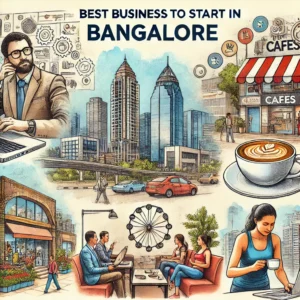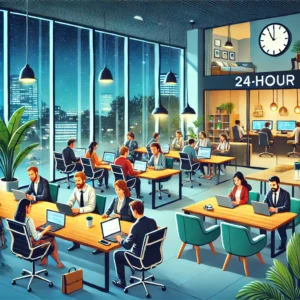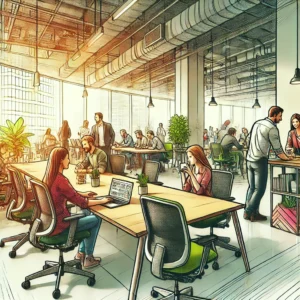In this blog post, we explore the IHCL Business Model to explain and understand how the Business Model of IHCL is structured and to learn about how IHCL makes money.
The Indian Hotels Company Limited (IHCL) is one of the largest and most respected hospitality companies in India. Founded in 1903 by Jamsetji N. Tata, the pioneer of India’s industrial revolution, IHCL has a rich history and a unique story of how it has evolved to become a significant player in the global hospitality industry. This blog post will use Alexander Osterwalder’s Business Model Canvas (BMC) as a framework to analyze IHCL’s business model and explore its key components in detail. We will also delve into the company’s history, its founders, and the story of how and why it was started.
- Background and Founders
Jamsetji N. Tata, the founder of the Tata Group, was an industrialist with a vision to transform India’s economic landscape. He realized that the country needed world-class infrastructure and industries to foster growth and development. His vision led to the establishment of several iconic businesses, including Tata Steel, Tata Power, and Tata Chemicals. Among these, the Indian Hotels Company Limited (IHCL) has a special place, as it was established to create a luxurious hotel experience for international travelers visiting India.
The story of IHCL began when Jamsetji N. Tata traveled to Europe and the United States in the late 19th century. During his travels, he observed the high standards of hospitality provided in the finest hotels of the world. He realized that India lacked such establishments, and decided to bring world-class hospitality to his country. This led to the creation of IHCL and its flagship property, the iconic Taj Mahal Palace Hotel in Mumbai, which opened its doors in 1903.
- IHCL’s Business Model Canvas
The Business Model Canvas is a strategic management tool developed by Alexander Osterwalder to help organizations visualize, understand, and innovate their business models. The BMC consists of nine building blocks that are interconnected and together form the blueprint of a company’s business model. These building blocks are:
- Customer Segments
- Value Proposition
- Channels
- Customer Relationships
- Revenue Streams
- Key Resources
- Key Activities
- Key Partnerships
- Cost Structure
Let’s explore each of these building blocks in the context of IHCL.
2.1. Customer Segments
IHCL caters to a diverse range of customer segments that can be broadly categorized into the following:
- Business Travelers: These customers are primarily corporate executives and professionals who require accommodation and other services during their business trips. IHCL’s properties are strategically located in prime business districts to cater to this segment.
- Leisure Travelers: This segment includes domestic and international tourists, who are attracted to IHCL’s properties for their luxurious accommodations, fine dining, and other recreational facilities.
- MICE (Meetings, Incentives, Conferences, and Exhibitions) Clients: IHCL provides state-of-the-art conference and banquet facilities, catering to the needs of organizations hosting MICE events.
- Long-stay Guests: IHCL offers serviced apartments and extended-stay hotels for customers who require accommodation for extended periods, such as expatriates or project-based employees.
2.2. Value Proposition
IHCL’s primary value proposition lies in providing a luxurious and authentic Indian hospitality experience. The company achieves this through the following:
- Iconic Properties: IHCL’s flagship hotels, such as the Taj Mahal Palace Hotel in Mumbai and the Rambagh Palace in Jaipur, are known for their stunning architecture, rich history, and distinctive experiences.
- Personalized Service: IHCL’s staff are trained to deliver warm, personalized service to guests, creating a memorable stay that is synonymous with the brand.
- Diverse Portfolio: IHCL’s diverse portfolio of hotels, resorts, and palaces caters to various customer preferences and budgets. Their brands include Taj Hotels, Vivanta, SeleQtions, and Ginger, each offering unique experiences and services.
- Culinary Excellence: IHCL is renowned for its culinary offerings, with award-winning restaurants and chefs, providing guests with an exceptional dining experience.
- Sustainability and Social Responsibility: IHCL is committed to sustainable practices and giving back to the communities in which it operates. Their initiatives include responsible sourcing, water and energy conservation, and support for local artisans and craftspeople.
2.3. Channels
IHCL reaches its customers through a variety of channels, including:
- Direct Sales: IHCL’s website and mobile app allow customers to search, book, and manage reservations directly. The company also has a dedicated sales team that caters to corporate and MICE clients.
- Online Travel Agencies (OTAs): IHCL partners with OTAs such as Booking.com, Expedia, and MakeMyTrip to reach a broader customer base and increase visibility.
- Travel Agents and Tour Operators: IHCL maintains relationships with travel agents and tour operators who recommend and book IHCL properties for their clients.
- Global Distribution Systems (GDS): IHCL’s hotels are listed on GDS platforms such as Amadeus, Sabre, and Galileo, which provide travel agents with real-time availability and reservation capabilities.
- Marketing and Public Relations: IHCL invests in marketing and public relations to build brand awareness and drive customer engagement, using channels such as print, digital, and social media advertising.
2.4. Customer Relationships
IHCL’s customer relationships are characterized by personalized service, loyalty programs, and feedback mechanisms.
- Personalized Service: IHCL’s staff are trained to anticipate and cater to guests’ unique preferences and requirements, creating an exceptional customer experience.
- Loyalty Programs: IHCL’s loyalty program, Taj InnerCircle, rewards repeat customers with points that can be redeemed for various benefits, such as room upgrades, dining experiences, and exclusive offers.
- Feedback Mechanisms: IHCL encourages guests to provide feedback through guest satisfaction surveys, online reviews, and social media interactions. This feedback is analyzed and used to improve service quality and customer experiences.
2.5. Revenue Streams
IHCL generates revenue through various streams, including:
- Room Revenue: The primary revenue stream for IHCL comes from the sale of rooms across its properties.
- Food and Beverage (F&B) Revenue: IHCL’s restaurants, bars, and in-room dining services contribute significantly to its revenue.
- Banquets and Conferences: IHCL earns revenue from MICE events, weddings, and other functions hosted at its properties.
- Other Services: IHCL also generates revenue from ancillary services such as spa treatments, fitness centers, and retail outlets within its properties.
2.6. Key Resources
IHCL’s key resources include:
- Property Portfolio: IHCL’s diverse portfolio of owned, leased, and managed properties is a critical asset that enables the company to cater to various customer segments.
- Brand Equity: The strong brand recognition and reputation of IHCL’s hotel brands, especially Taj Hotels, contribute to its success and customer loyalty.
- Skilled Workforce: IHCL’s skilled and experienced workforce, including hotel staff, management, and corporate employees, play a crucial role in delivering exceptional service and driving the company’s growth.
- Technology Infrastructure: IHCL’s technology infrastructure, such as its website, mobile app, property management systems, and customer relationship management systems, supports its operations and customer interactions.
2.7. Key Activities
IHCL’s key activities include:
- Hotel Operations: IHCL manages the daily operations of its hotels, resorts, and palaces, ensuring that they meet the highest standards of service, quality, and safety.
- Sales and Marketing: IHCL’s sales and marketing efforts aim to build brand awareness, attract new customers, and maintain relationships with existing clients.
- Property Development and Renovation: IHCL continually invests in the development of new properties and the renovation of existing ones to maintain its competitive edge and cater to evolving customer preferences.
- Human Resource Management: IHCL focuses on recruiting, training, and retaining talented employees, as they are critical to delivering the company’s value proposition.
- Sustainability and Corporate Social Responsibility: IHCL is committed to sustainable practices and engaging in initiatives that benefit the communities in which it operates.
2.8. Key Partnerships
IHCL’s key partnerships include:
- Real Estate Developers and Owners: IHCL partners with real estate developers and property owners for the development, leasing, or management of its properties.
- Online Travel Agencies (OTAs): IHCL collaborates with OTAs to increase visibility and reach a wider customer base.
- Travel Agents and Tour Operators: IHCL maintains relationships with travel agents and tour operators to drive bookings and recommendations.
- Global Distribution Systems (GDS) Providers: IHCL partners with GDS providers to facilitate real-time availability and reservation capabilities for travel agents.
- Suppliers: IHCL works with suppliers of food and beverage, linens, toiletries, and other essential items to ensure the smooth operation of its properties.
2.9. Cost Structure
IHCL’s cost structure consists of various components, such as:
- Property Development and Maintenance: IHCL incurs costs related to the development, renovation, and maintenance of its properties.
- Employee Salaries and Benefits: IHCL’s workforce represents a significant portion of its costs, including salaries, benefits, and training expenses.
- Marketing and Advertising: IHCL invests in marketing and advertising to build brand awareness and attract customers.
- Utilities and Services: IHCL bears the cost of utilities, such as electricity and water, as well as services like waste management, security, and insurance for its properties.
- Commissions and Fees: IHCL pays commissions to travel agents, OTAs, and GDS providers for bookings and reservations.
The Story of IHCL: Evolution and Growth
Since its inception in 1903, IHCL has grown exponentially, both in terms of its property portfolio and its geographic presence. The company’s evolution can be traced through several key milestones:
- Early Years (1903-1950): IHCL began with the opening of the Taj Mahal Palace Hotel in Mumbai, which was soon followed by the Lake Palace Hotel in Udaipur and the Rambagh Palace in Jaipur. These iconic properties quickly gained a reputation for their luxurious accommodations, personalized service, and authentic Indian hospitality.
- Expansion and Diversification (1950-2000): During this period, IHCL expanded its footprint in India and entered new markets, such as the Middle East and Africa. The company also diversified its portfolio by introducing new hotel brands like Vivanta and Ginger, catering to different customer segments.
- Global Expansion (2000-Present): IHCL further expanded its presence by acquiring and managing properties in key international markets, including the United States, the United Kingdom, and Australia. The company also strengthened its focus on sustainability and social responsibility during this period.
Today, IHCL operates over 200 hotels across 12 countries, serving millions of guests each year. The company’s success can be attributed to its strong brand equity, diverse property portfolio, and commitment to delivering exceptional service and memorable experiences.
The Indian Hotels Company Limited (IHCL) is a testament to the vision and determination of its founder, Jamsetji N. Tata, who sought to bring world-class hospitality to India. Over the years, IHCL has evolved and grown, adapting to changing customer preferences and market dynamics. The company’s diverse portfolio of brands, commitment to personalized service, and focus on sustainability and social responsibility have been key drivers of its success.
By examining IHCL’s business model through the lens of Alexander Osterwalder’s Business Model Canvas, we gain a deeper understanding of the company’s strategy, operations, and growth trajectory. From customer segmentation and value proposition to key resources and cost structure, IHCL’s business model reflects a holistic approach to delivering exceptional experiences to its guests.
As IHCL continues to expand its footprint and innovate its offerings, the company’s story serves as an inspiration for entrepreneurs and business leaders who aspire to create lasting value and impact in their respective industries. By staying true to its roots and constantly adapting to the changing landscape, IHCL has carved a unique niche for itself in the global hospitality industry and remains a shining example of Indian entrepreneurship and innovation.
Did you know? Corporate teams like to use our coworking space in Bangalore.
Learn more about our coworking space on our YouTube channel Work Theater Studios where we talk about a variety of topics including personal finance, entrepreneurship, business and life.
Did you know? We also have a private theatre in Bangalore.




